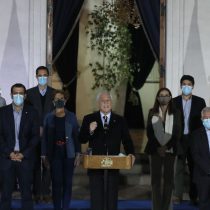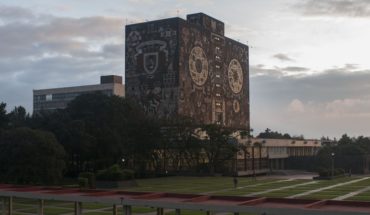
The election days of this Saturday and Sunday will go down in the history of Chilean politics as the days when the death certificate of the “party of order” was officially decreed, made up of the communities of the former Concertación and the right that – after the return to democracy – held power for decades, and which was taken from them in these mega-elections by the independents , following a complex process initiated on 18 October 2019.
This political sector, that of the independents that this weekend was raised as the alternative to traditional parties, was the same one that in the social outburst had to take to the streets to demand for the social, political and economic changes that for 30 years were repeatedly told that they were impossible to carry out, having to settle for good macroeconomic rates and with average pensions for retirees of 200 thousand pesos.
And just as in the massive demonstrations in Plaza Italia, or Place de la Dignidad, the flags of the parties never had room, in these mega-elections the situation was repeated, but through the dramatic count of votes that he left in the last places on the right (37 seats), with 23.9% nationally, and also to the list Of Dignity Apprehend (PC and Broad Front , 28 seats), with 18.1%, while the communities of the former Concertation won 25 seats, with 16.1% of the preferences, in contrast to the 41 seats obtained by the independents.
In particular, Chile Vamos lost the veto capacity that it always aspired to and dreamed of preserving the institutional architecture of the Political Constitution of dictator Augusto Pinochet, through the two-thirds quorum, that necessary percentage that the Constitutional Convention must have to approve the rules and voting regulations. This time, the calculations on the right failed and he only got 37 seats, missing 14 seats. Jaime Guzmán, key to the drafting of the 1980 Constitution, must be wallowing in his grave.
The 37 seats obtained by officialism thanks to the powerful support of the economic groups that financed their candidacies, will not succeed in keeping the Fundamental Charter in full and today it has only to defend some of its principles, warns an electoral analyst on the right: “Freedom, the presidential regime and the right to property”. These will be the issues that will try to protect with nails and teeth in a Convention that will be adverse to them, plagued by 48 independents such as Aunt Pikachu, Giovanna Grandón, of the People’s List, whose vote will be worth the same as that of the representative of the Rejection Marcela Cubillos (UDI), who got a national vote with 23% for the 11th arrondissement. Not a minor fact is that from the People’s List, of 50 candidates, 22 won a seat.
The Ghost of the Third Retreat
Preserving status quo this sector, which, in the midst of the civic-military dictatorship, built the kind of society that Chile has maintained so far and which Chile, in less than a year, has told it in two votes that it is not willing to maintain. So Chile Vamos will have to seek by all means to build new alliances in the Convention to isolate those that they consider “ultras” and that – in their logic – will seek to lower the shelf of a country that ceased to be an example in Latin America. A true “comb operation”, in which some opposition parliamentarians who won some of the 155 seats could be incorporated. But they will also search among the 48 independents and among some of the 17 representatives of native peoples who could lean, in a smaller number, to the right. The task is completely difficult.
Before starting this work, however, Chile Vamos must have its “night of long knives”, says an industry analyst, who assures the government that the official political parties will be screwed by the desastrous election result, which is their greatest defeat since the recovery of democracy, accusing each other that there was not enough support from La Moneda to the candidates and that they were wrong to bring the third withdrawal of the funds of the AFP to the Court Constitutional (TC).
Usach’s political and academic scientist, Pamela Figueroa, agrees with that analysis and assures The MostrAdor that “Piñera sank right” with all the disintelligence shown during the pandemic, and led her to lose the right to veto, so today any matter that oppositions and independents wish to incorporate into the blank sheet of the new Constitution, will have a place, in view and patience of an officialism that has already dilapid all maneuvering capacity in this crisis that will lead , coming soon, to a new cabinet change.
Piñera’s Mea Culpa
The Representative reacted almost immediately and admitted that “citizens have sent us a clear and strong message to the Government and to all traditional political forces: we are not properly attuning to the demands and longings of citizens and we are being challenged by new expressions and new leadership. It is our duty as a government to listen humbly and carefully to the message of the people.” Message I could have read in the various banners that were raised in many cities of the country for several months and after October 18, 2019. Moreover, it is more than clear that La Moneda was late in financial aid to the population during the current COVID-19 pandemic and did not want to address the message sent to it by a much more empowered and conscious citizenry of the need to end a model from which it was marginalized.
A similar mea culpa made the presidential candidate of National Renewal, Mario Desbordes, who acknowledged that his sector “was not able to interpret the citizen majority who was calling for change, which was mobilized, which he pointed out with an overwhelming majority of 80% in favor of the Apruebo”. And it was part of that same percentage that rejected the postulation of the Evópoli Gonzalo Blumel, former Minister of the Interior, leaving him out of the Convention with little 4,6%. Who would have thought that the man who for more than a year was Piñera’s chief of staff, with press coverage that any politician loved him, was going to lose this election. The answer is clear: citizens no longer want the same, disapprove of a government that did not live up to the crisis and only hopes that the drafters of the new Constitution will structure a new social pact where their rights are recognized and respected. That’s the new Chile coming, the same one that woke up in the spring of 2019.
Instead, the country chose the lawyer with more than 103 thousand votes Daniel Stingo, which earned 24.7% of preferences in District 12. And Benito Baranda, which reached 12.6%. They will be part of the new representatives who, as of this Monday, will have to agree, first, to agree on a regulation, and then draft a new Constitution with which the leitmotif of Senator Jaime Guzmán: “If our adversaries govern, they should be forced to act in a way that is not very different from what we want.” That reckless sentence is already part of the past.





